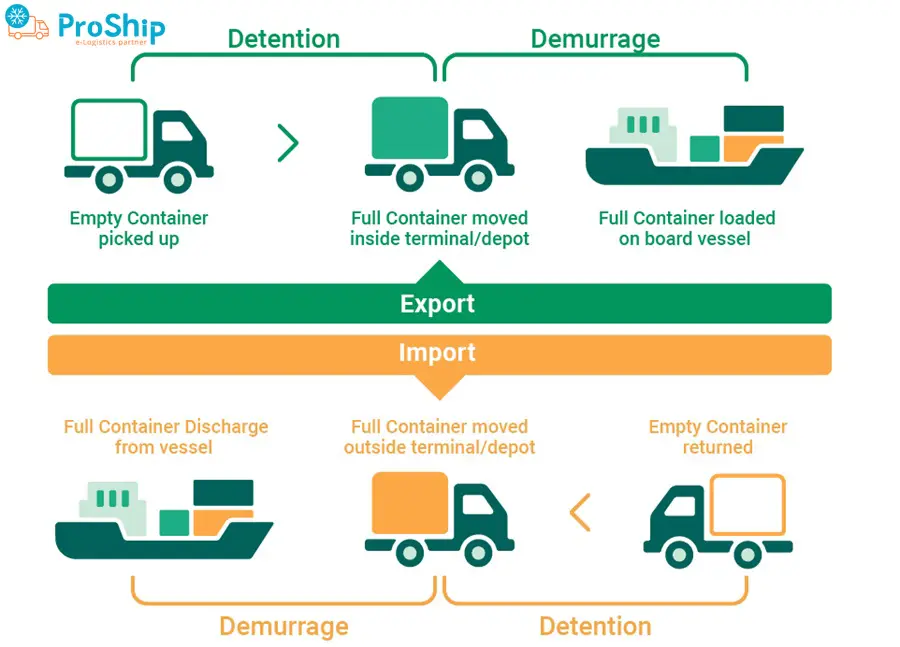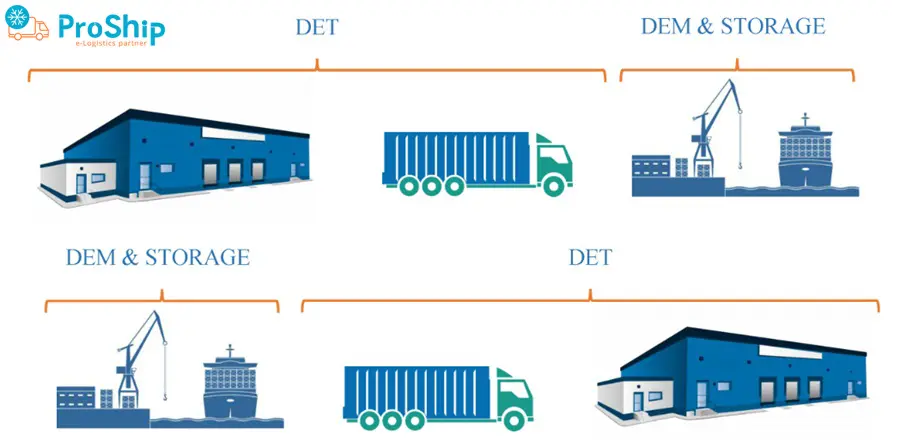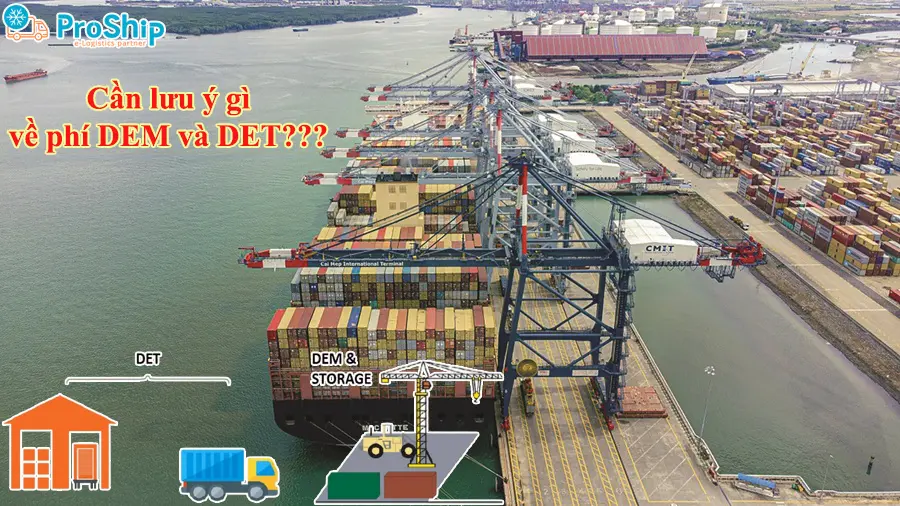x Doanh nghiệp bạn đang làm hàng xuất, nhập đường biển cần biết phí DEM, DET là phí gì?
x Bạn mới tham gia trong lĩnh vực vận tải biển, cần tìm hiểu giữa DEM và DET có gì khác nhau?
x Bạn muốn biết cách tính và cách làm sao để tránh phát sinh phí DEM và phí DET?
Điểm giống hay khác nhau giữa phụ phí DEM và DET trong vận chuyển đường biển quốc tế sẽ được PROSHIP.VN chúng tôi chỉ ra sau đây. Cùng với đó là giải đáp rõ hơn về phí DEM là gì, DET là gì và một số lưu ý liên quan khác. Từ đây, doanh nghiệp xuất nhập khẩu có thể dự trù trước mọi khoản phí có thể phát sinh trong quá trình vận tải biển.
>>XEM THÊM:
DEM, DET là phí gì?
DEM là gì?
DEM là gì? DEM viết tắt của Demurrage charge, tức là phí lưu container tại bãi do hãng tàu thu từ khách hàng rồi đóng lại cho cảng một khoản theo thỏa thuận riêng. Phí DEM được tính bằng đơn đơn vị tiền/ngày/container.
Mỗi hãng tàu sẽ có chính sách miễn phí khi lưu container tại bãi cho khách hàng trong một khoảng thời gian quy định. Quá thời hạn này thì hãng tàu sẽ bắt đầu tính phí cho đến ngày lấy hàng. Thông thường, phí DEM được miễn phí từ 1-7 ngày đối với container khô và 1-3 ngày đối với container lạnh.
- Phí DEM hàng nhập: Thời gian tính phí DEM hàng nhập được tính kế từ ngày tàu cập cảng cho đến khi khách hàng lấy container ra khỏi Cảng.
- Phí DEM hàng xuất: Thời gian tính phí DEM hàng xuất được tính kể từ khi container được đưa vào Cảng cho đến thời gian cắt máng (Cut off time) của lô hàng.

DET là gì?
DET là gì? DET viết tắt của Detention charge, là phí lưu container trong kho của cảng, được đóng trực tiếp cho hãng tàu. Phí DET cũng có chính sách miễn phí lưu được tính theo ngày và tùy chủng loại, kích thước của container.
- Phí DET hàng nhập: Phí DET tính kể từ ngày trả cont rỗng trễ so với thời gian miễn phí.
- Phí DET hàng xuất: Phí DET tính từ ngày lấy cont rỗng sớm hơn so với thời gian hãng tàu cho phép lấy. Nếu lấy trễ hơn thì không bị tính phí DET.
Điểm khác nhau và cách tránh phí DEM, DET
Hãy cùng Proship tìm hiểu điểm giống, khác nhau và cách tránh phí DEM, DET:
Sự khác nhau giữa phí DEM và DET
Điểm giống nhau, khác nhau giữa DEM là gì và DET là gì? Chi tiết thể hiện:
|
GIỐNG NHAU |
|
|
|
|
KHÁC NHAU DEM và DET chênh lệch tại vị trí container và các bên chịu trách nhiệm. |
|
|
DEM |
DET |
|
|

Cách tránh các khoản phí DEM và DET
Để tránh các khoản phí DEM và DET, doanh nghiệp có thể:
- Sắp xếp nhà kho: Đảm bảo một nhà kho đủ lớn và đủ sức chứa để trả container về cảng kịp thời sau khi hàng được dỡ;
- Thay đổi cảng trung chuyển: Nếu có tắc nghẽn hoặc vấn đề tại cảng gốc, hãy xem xét thay đổi cảng trung chuyển hoặc cảng dỡ hàng;
- Lên kế hoạch đúng đắn: Lên kế hoạch và đặt trước container. Đồng thời, chọn một hãng tàu có uy tín cho tuyến đường vận chuyển thuận lợi;
- Thương lượng thêm thời gian: Trong một số trường hợp, hãng tàu có thể thương lượng thêm thời gian dỡ hàng mà không tính phí DEM/DET;
- Theo dõi container: Theo dõi chặt chẽ container để làm thủ tục hải quan kịp thời và nhận container từ bến ngay khi container đến.
Cách tính phí DEM và DET chuẩn xác thế nào?
Cách tính phí DEM
Phí DEM (Demurrage) = Demurrage time = Demurrage fee = Demurrage charge = Phí lưu bãi = Thời gian lưu bãi
Khoản phí này được tính bằng ngày, kể cả ngày thứ 7, chủ nhật và các ngày lễ. Đây là khoảng thời gian mà hãng tàu sẽ cho phép chủ hàng để container ở bãi/cảng.
Với hàng nhập:
- Với container khô, thời gian miễn phí DEM là khoảng 1-7 ngày, đối với container lạnh thi miễn phí trong 1-3 ngày;
- Phí DEM được tính kể từ ngày quá hạn đến ngày bạn lấy hàng;
- Phí DEM được tính bằng đơn vị là tiền/ngày/container (tùy thuộc vào chủng loại và kích thước của container).
Với hàng xuất:
Thời gian miễn phí DEM đối với hàng xuất thường là từ 1-7 ngày cho container khô và 1-3 ngày cho container lạnh. Thường thì hàng xuất hiếm khi phải trả phí DEM. Chỉ khi xảy ra những tình huống đặc biệt như việc rớt hàng do trễ thủ tục hải quan hoặc có các lý do khác, người gửi mới phải đóng phí DEM.
Cách tính phí DET
Phí Detention = Detention time = Detention fee = Detention charge = DET = Phí lưu cont = Thời gian lưu kho
Khoản phí ngày được tính bằng ngày, bao gồm cả ngày thứ 7, chủ nhật và các ngày lễ. Đây là khoảng thời gian mà hãng tàu cho phép chủ hàng để giữ container tại kho của mình.
Với hàng nhập:
Phí DET sẽ bắt đầu tính từ ngày trả rỗng muộn hơn so với thời gian được miễn phí.
Với hàng xuất:
Phí DET được tính từ ngày hãng tàu cho phép lấy container so với ngày người gửi đến lấy container. Nếu như lấy sớm hơn sẽ phải trả phí, lấy trễ hơn sẽ không tính phí DET này.
Những lưu ý cần biết về phí DEM và DET
Dưới đây là những lưu ý cần biết về phí DEM và DET:
- Phí DEM, DET, STORAGE tính dựa trên số ngày bị trễ, kích thước và chủng loại của container. Phí đóng container lạnh thường cao hơn rất nhiều so với các loại container khác;
- Nếu hàng được đóng tại bãi sẽ không chịu phí DET;
- Phí DEM, DET là khác nhau với các hãng tàu khác nhau;

- Thời gian miễn phí DEM, DET được tính cho cả ngày nghỉ lễ, thứ 7 và chủ nhật. Tuy vậy, vẫn có những trường hợp đặc biệt được áp dụng linh hoạt cho khách hàng;
- Khi booking hàng, phải luôn làm rõ ràng về thời gian miễn phí DEM, DET tại cảng xếp, dỡ hàng;
- Có thể gia hạn thời gian miễn phí DEM và DET khi: hãng tàu có sử dụng chính sách miễn phí, mức độ quan trọng của khách hàng như volume hàng hóa, mối quan hệ với hãng tàu,…
DEM là gì và DET là gì cũng như điểm khác nhau giữa DEM và DET đã được giải đáp. Cả hai loại phí này đều phải đóng cho hãng tàu và chúng xuất hiện cả tại cảng xếp hàng, cảng dỡ hàng…Mọi thắc mắc liên quan, vui lòng liên hệ 0909 344 247 để được Proship Logistics giải đáp và tư vấn các Dịch vụ vận chuyển Đa phương thức trọn gói giá tốt nhất.

